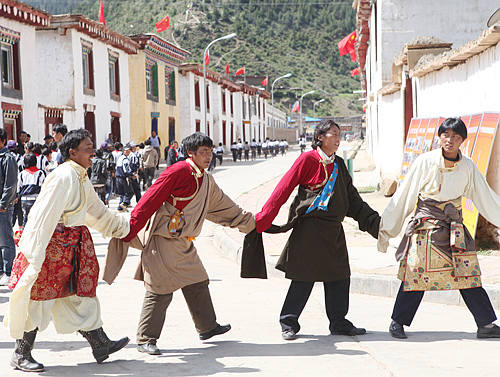|
 |
|
NEWFOUND FRIENDS: Residents in Enda Village of Riwoqe County, Tibet, dance in the village square (YANG JIAO) |
To Ahsang, who lives in a two-story house with his family in Enda Village of Riwoqe County, Tibet Autonomous Region, life in a small, wooden hillside cottage before 2004 is already a distant memory.
Actually, Ahsang had lived there for 60 years. The tiny domicile, while quaint, was hardly what most people would consider a home. The family's livestock lived in an adjacent room, although the division between man and beast's living quarters was without solid walls or fences. Without running water or electricity, Ahsang's family would have to walk downhill half an hour to fetch buckets of water and then haul them back up to the cottage. Television and other home appliances were reserved for the family's dreams.
Some 110 households in the village used to live similar lives. Scattered about the hillsides, without proper roads, electricity, televisions, radios and telephones, they had little connection with the outside world. Poor infrastructure restricted economic development. In 2004, the per-capita annual net income of Enda villagers was only 2,300 yuan ($356), according to figures from the county government.
Out with the old
In 2004, the county government began providing subsidies to farmers and herdsmen who built new houses. The government offered each household 60,000 yuan ($9,273.57) for building projects and villagers were allowed to select sites for their new houses closer to one of the country's major highways.
The government stepped up building of roads, installed street lamps and built public squares in newly built villages. It also launched programs to make electricity, telecommunications services and safe drinking water accessible to all relocated villagers. Due to the efforts, a new primary school was built in Enda.
Having lived their hillside lives for generations, this flash flood of change was more than most villagers could accept.
"It was a little difficult to convince them about the programs," Wu Xianli, Secretary of the Committee of the Communist Party of China of Sangdo Town, told Beijing Review. "Some villagers worry they wouldn't be able to afford the new houses, even with government subsidies."
Wu said some people were reluctant to move because they were nostalgic to old homes where their ancestors lived and they themselves grew up.
At first, the flow of households willing to build and move into new houses was only a trickle, but the prospects of a convenient new life in a better house quickly encouraged other villagers to follow suit.
Pema Lhangjia is among those willing to build a new house. Life on the hillside was difficult, with his children forced to trek down the side of the mountain every day to go to school. Buying daily necessities was an arduous task that forced the family to travel to the nearest town 20 km from their home. When the government launched the relocation program, Pema Lhangjia wouldn't budge from the home of his forefathers. With financial assistance from the government and the possibility of providing a much better standard of living for his family, he eventually gave in.
The benefits of living in the new house are evident. Pema Lhangjia's children now only spend five minutes walking to school in the morning. The streets of the new village where he lives are lined with stores. With electricity, tap water and natural gas at their disposal, the family's everyday life has been markedly improved, allowing Pema Lhangjia and his wife to focus on increasing their income.
"Now our life is very good," Pema Lhangjia told Beijing Review.
Today, all 118 households in Enda have moved into new houses, each with an average floor space of 300 square meters, according to the government of Riwoqe.
| 